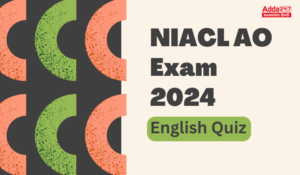SBI Clerk Main English Language Quiz
Directions (1-9): Read the following passage carefully and answer the questions given below it. Certain words are given in bold to help you locate them while answering some of the questions.
Chinese smartphone users have the world at their fingertips. With a few taps, they can order food, message their friends, send money, read the news, play games, hail a taxi, pay off utility bills, and more through a single app like WeChat. But there’s a catch. All this convenience comes with a heavy price: their freedom and privacy. Thanks to China’s Internet giants – Baidu, Tencent, and Alibaba – the authoritarian regime now has the means to monitor a user’s every action, purchase, thought, and location in real-time. The Chinese government has long sought the means to more closely keep tabs on its citizens, but with smartphones, people are voluntarily logging their every move for the government. While tech titans like Google, Amazon, and Facebook have become essential to the daily lives of many Americans, their reach pales in comparison to their Chinese counterparts. This year, 79.1 percent of all smartphone users in China are expected to use WeChat, a messaging app, with nearly 500 million people using it at least once a month. To put that in perspective, that’s more than the entire population of the United States, Canada, and Mexico combined.
But what makes WeChat’s use so significant is how deeply integrated it is with a person’s daily life. Far more than just a messaging app, WeChat is a hub through which Chinese smartphone users access the Internet and other services. In addition to its basic communication functions, WeChat enables users to order wine, check in for a flight, make a doctor’s appointment, get banking statements, search for books at their local library, donate to charity, pay for things offline, and more. An American venture capitalist described WeChat as being “at every point of your daily contact with the world, from morning until night.” Meanwhile, Alibaba China’s equivalent of Amazon, delivers an average of 30 million packages a day, more than the U.S. Postal Service on its busiest day in history. In 2014, 86 percent of all shopping done on smartphones in China was through Alibaba. A byproduct from all this heavy use is a torrent of rich data that reveal highly-detailed specifics about each individual user. But unlike the United States, which has laws – imperfect as they may be – about when and how the government can access this type of data, no such prohibitions exist in China. Tech companies routinely hand their data to the government which has made no secret about its efforts to integrate that data into its surveillance apparatus.
With the help of a mobile phone company, police in the city of Guiyang are tracking the movements of migrant workers in real-time. And as part of its anti-corruption crackdown, officials are monitoring social media accounts to trace spending on wine and luxury goods. China’s censors already meticulously monitor social media for taboo topics like criticizing the government or promoting democracy, and now they are going even further. The Chinese Ministry of Education has suggested cataloging the individual political sentiments of university students. By pulling data from library records, surveys, and social media posts they hope to create a political ideology database. But perhaps the most worrying development is the government’s plan to create a “social credit” rating system. An individual’s score will be determined by social, financial, and political behaviors that are drawn from a variety of databases. Infractions would include falling behind on bills, jaywalking, and violating family-planning rules. Those with low scores will have a harder time travelling, securing loans and insurance, and would be barred from privileges likes staying in a luxury hotel. Meanwhile, individuals like lawyers and journalists will be more closely monitored. According to government planning documents, the system will “allow the trustworthy to roam everywhere under heaven while making it hard for the discredited to take a single step.”
The rating system is currently being tested in 40 towns and cities across China with plans to expand it nation-wide by 2020.The elaborate social rating system envisioned by the Chinese government can be traced to the dang’an. Created under Chairman Mao, the dang’an, or personal file, contains an individual’s grades, employment record, and reports on how they interact with others, their religious affiliations, psychological problems, and potential political liabilities. But the proposed rating system would take the dang’an to another level. The government can now add every purchase an individual makes online as well as their search history to their digital file. Purchasing certain products could potentially affect a person’s score. In a controversial move, Alibaba’s rating system Sesame Credit, which functions like eBay seller ratings, takes into account what a user buys online. “Someone who plays video games for 10 hours a day, for example, would be considered an idle person, and someone who frequently buys diapers would be considered as probably a parent, who on balance is more likely to have a sense of responsibility,” said Li Yingyun, Sesame’s technology director.
Q1. According to the passage, why does the convenience of using the Chinese smartphones comes with a heavy price?
(I) they can do a large number of things like-messaging, reading news, paying bills etc.
(II) they don’t have freedom to choose their course of life
(III) they are forced to lead a life full of restrictions and misery
Q2. Why does the WeChat is considered as the ‘lifeline’ of people in China?
Q3. Why the government is planning to roll -out the concept of “social credit” rating system in China?
Q4. The dang’an will indirectly slit the throat of the common people of China. What does it signify?
Q5. Which of the following statement is NOT TRUE in the context of the passage?
Q6. Give a suitable ‘title’ for the passage.
Q7. Choose the word/group of words which is most SIMILAR in meaning to the word/group of words printed in bold as used in passage.
voluntarily
Admonitorily means giving or conveying a warning or reprimand
Q8. Choose the word/group of words which is most SIMILAR in meaning to the word/group of words printed in bold as used in passage.
prohibitions
or forbidding something
gradual accumulation of additional layers or matter
child or young
Hence, interdiction has same meaning as
prohibition
Q9. Choose the word/group of words which is most OPPOSITE in meaning to the word/group of words printed in bold as used in passage.
meticulously
Sloppily means in a messy or careless way
Statutorily means of relating to, or of the nature of a statute
Hence, Sloppily will be the exact opposite of meticulously
Directions (10-15): Read the following passage carefully and answer the questions given below it. Certain words are given in bold to help you locate them while answering some of the questions.
Unfortunately, our heritage from the industrial age dictates that standardisation and depersonalisation of individuals does work. Consequently, most firms are so inbred that you sometimes expect the next person to show up with a huge head, red curly hair, and an extra eye in the middle of the forehead. We should not expect too much innovation at a company where 95 percent of the employees look and think exactly the same. And if people want to change, they only want to become even more like the boss. In the inbred firm, repetition dominates at the expense of renewal, and the exploitation of givens crowds out the creation of novelty. Innovation, on the contrary, is contingent on variation, and on individuals who refuse to take part in the look-and-act-alike competition. True, you can say a lot of things about people such as Richard Branson, Anita Roddick, Ross Perot, Luciano Benetton, and Bill Gates, but you can’t say they are normal. Normal people do normal things, with normal results. And one thing is for sure, the average has never won, and it never will.
The main difference in a surplus society is that the average is getting an addition of some 3000 million people in other parts of the world, a large number of start up companies, and a plethora of new customer offerings, and they all want to share the new wealth. And guess what -a lot of these people are no longer only good at producing plastic flowers and cheap toys. Economies such as those of Taiwan or Hong Kong are already knowledge based, where more than 65 percent of gross domestic product is generated by service-related activities. On the west coast of the USA, some of the more prestigious universities, such as Stanford, Berkeley, and UCLA, are using a quota system to limit the number of students from southeast Asia. Competing on grades, many Americans would not stand a chance. A country like Singapore, which author William Gibson once described as “Disneyland with death penalty, “spends 25 percent of its GDP on research, development, and education. It does not take a genius to figure out who they are sentencing right now.
In what ways can you create temporary monopolies in the age of abundance? To answer this question, we need to look at the historical evolution of the bases of competitive advantage. In the beginning, competitive advantage was primarily derived from location. It was the access to raw materials that provided the specific advantages necessary to create and exploit temporary monopolies. The successful company of the 19th century profited from access to oil, forests, mines, etc. Families such as the Rockefellers became incredibly rich. However, the capitalist economy is ruthless. Soon, free markets for raw materials made it increasingly difficult to use location as the single source of competitive advantage.
As this happened, technology and innovation, together with the access to capital, became the new differentiator. The key to competitiveness was creating more value out of the same input. At the turn of the century, the business community was thus dominated by a number of well-known capitalists, a few entrepreneurs, and their innovations -Thomas Alva Edison, Alfred Nobel, Otto Diesel, the separator, the automobile, and the ball-bearing. Competitive edge was based on ingenuity. However, once again the market struck back. Products were imitated and patents were sold or acquired. When these innovations were turned into everybody’s property, competitive advantage could no longer be based on a former technological monopoly.
Consequently, we entered the organisational age. In the USA, pioneers such as Alfred Sloan and Henry DuPont designed the multidivisional firm, an architecture which later came to dominate the structure of most large, complex firms. The new organisation allowed a continuous upgrading of previous technological advantages. Progressively, throughout the latter half of the 20th century, consequent types of organisational innovations have given rise to new temporary monopolies; JIT, BPR, MBO, MBWA, Kanban, matrix management, outsourcing, downsizing, lean production, etc. The list could go on ad infinitum.
Gone are the days of the bureaucratic firm that Max Weber outlined almost a century ago. Jack Welch at General Electric even characterises the hierarchical firm as an organisation that has its face towards the CEO and its back toward the customer. Today, if you belong to the in-crowd, your organisation is supposed to look like a blueberry pancake, a fishnet, a shamrock, gazelles, or even boiling spaghetti. Most modern firms still base their competitiveness on developing organisational solutions that enable them to uphold a fruitful balance between exploiting givens and creating novelty. However, as we see it, there is reason to believe that this source of competitive advantage is also soon to be overshadowed.
Right now, international consulting companies are conducting arbitrage on diffusing identical organisational solutions around the world. McKinsey & Company, Andersen Consulting, Boston Consulting Group, and Cap Gemini to name but a few, all contribute to the current global homogenisation of organisational solutions. A cadre of MBA students from all continents read the same books, learn the same recipes, and go to work for competing firms. These people contribute to more rapid imitation and similar solutions. Moreover, the introduction of IT, to enable increased customisation, co-ordination, communication, etc., will certainly give a number of companies some initial advantages. However, as nearly all firms become virtual and wired, we foresee that information technology will act as a homogenising force, making company structures even more similar.
Naturally, given variations in values and institutional settings in different parts of the world, certain differences will probably never disappear. Still, it is worth noting that even something as accepted as lifetime employment in Japan appears to be giving way to arrangements involving more flexibility. Currently, as much as 25 percent of the Japanese workforce is made up of part-timers and temps. Nevertheless, as a consequence of increasing global organisational homogenisation, we predict that it will become increasingly difficult to base temporary monopolies on purely organisational innovations.
So what do we do if competitiveness can no longer be based on location, technological innovation, or the structuring of our organisation? In our view, it is time to start exploiting the last taboo -to build competitiveness around and on something we all know exists but which is seldom discussed in business situations. We must start basing our temporary monopolies on emotions and imagination. Exploiting the last taboo means departing from the tradition that people are to be treated as just another factor of production, a human resource. It is our experience, and, we suspect, yours too, that few people enjoy being treated as human resources: they want to be seen as individuals.
Q10.Which of the following would best align with the viewpoint of the author, as stated in the passage?
Q11. All of the following are true with respect to the passage, except that:
Q12. Which of the following, according to the passage, was the cause of the destruction of the monopoly based on former technology?
Q13. Location could not become the single source of competitive advantage, as made out by the passage, because:
Q14. The passage has been handled in a manner which is:
Q15. Choose the word/group of words which is most SIMILAR in meaning to the word/group of words printed in bold as used in the passage.
Inbred
Foil means hinder or prevent.
Extant means still in existence.
Instigate means provoke.
Inane means devoid of intelligence
- Tips and Tricks To Solve Cloze Test Questions For Bank and Other Competitive Exams
- Conjunctions: English Language Notes for Bank and Other Competitive Exams





 English Quiz For NIACL AO Mains 2024 Exa...
English Quiz For NIACL AO Mains 2024 Exa...

